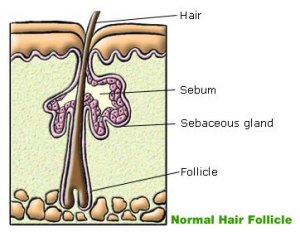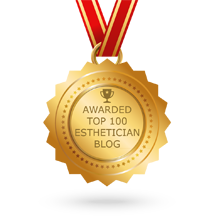If you suffer from oily skin, shiny skin, or acne you’ve probably given the amount of oil or sebum your body produces some thought. Probably that thought is: “Why does my body produce so much oil and how can I stop it?”. Well before you try to entirely rid your skin of oil keep a few things in mind.
According to the Skin Type Solutions blog:
In simplest terms, sebum is just oil secreted by your skin’s sebaceous glands. Sebum is actually Latin for “fat,” which makes sense, and every square inch of your skin—with the exception of the palms of your hands and the soles of your feet—has it.
Most of us tend to focus on the negative side of sebum, such as its ability to make your face look shiny, and its connection with acne. But the presence of sebum is actually good for your skin since it protects the skin from losing moisture. Yet another good thing about sebum is that it contains a lot of vitamin E, an antioxidant that protects the skin from aging as well as cancer. (The skin on the lips does not make sebum, which is why this area is more prone to skin cancer.)
Dermatologists are intrigued by the components of sebum, which seems to be determined by your individual genetic makeup. Upon taking a closer look, researchers have found sebum contains triglycerides, diglycerides, fatty acids, wax esters, squalane and cholesterol—why is why cosmetic chemists incorporate some of these ingredients in anti-aging creams. It was once believed that squalane levels in the sebum contributed to acne, but again, no definitive link has been made. Squalane is often added to skin creams so those with oily and acne-prone skins should avoid this ingredient to be on the safe side.
If you have acne then you have to deal with the excessive production of sebum by your body which contributes to breakouts. According to the book Breaking Out (page 20):
People who are prone to acne tend to produce higher-than-average amounts of sebum. This gives them oily skin – seborrhea, as it is called. Seborrhea has no direct link with what you eat; the fats and oil in your diet are broken down by the digestive system, and there is no pathway from there to the skin.
Nor is sebum production influenced by anything you apply to your skin. No matter how dry or tight they may make your face feel, astringent soaps, lotions, or cosmetics that mop up oil on the skin’s surface cannot retard sebum output. Nor, contrary to popular belief, do they stimulate the sebaceous glands to overcompensate by stepping up oil production to lubricate the dried-out surface. Sebum output is strictly under the domination of hormones that are indifferent to cleansers, toners, and other topical oil-control treatments.
The connection between hormones and sebum does not necessarily mean that if you have excess oil on your face, your body is producing an overabundance of testosterone, or that your skin boasts an excess follicle-stimulating DHT. It is instead, typically, a sign that your sebaceous follicles are super-sensitive to these hormones and that they overreact to them, sending out the gush of shine-creating oil that is the most common feature of acne-prone skin.
So perhaps the next time you look at your oily face try to turn a negative into a positive and remember that the sebum in your skin can be beneficial. But if your shiny face is bothering you, and I sympathize greatly since my face can look like an oil slick by the afternoon, follow my tips in my post Shine Free: How to Deal with Excessively Oily or Shiny Skin for solutions.



[…] April 21, 2011 by extradryskin If you suffer from oily skin, shiny skin, or acne you’ve probably given the amount of oil or sebum your body produces some thought. Probably that thought is: “Why does my body produce so much oil and how can I stop it?”. Well before you try to entirely rid your skin of oil keep a few things in mind. via askanesthetician.wordpress.com […]
[…] […]
[…] even if it isn’t usually dry, and, all of it helps your body regulate the natural oil (sebum) that your skin releases. Most other shampoos use chemicals that cling to your natural bodily […]
[…] blood circulation within your scalp as well as boost the sebaceous gland to enhance secretion of sebum oil. An acid mantle is formed with the combination of sebum and sweat that acts as a protective […]
[…] skin. In fact, not getting enough sleep can cause your glands to overcompensate and produce extra sebum, which makes acne even worse. So, if you just got a new job, recently became a parent or just party […]
[…] [1]https://askanesthetician.wordpress.com/2011/04/21/what-is-sebum-its-more-interesting-than-you-think/ […]
[…] While many products falsely advertise the ability to get rid of sebum, skin care specialists will tell you that applying products to the skin does not affect sebum production. Hormones dictate how much sebum your glands secrete. [source] […]